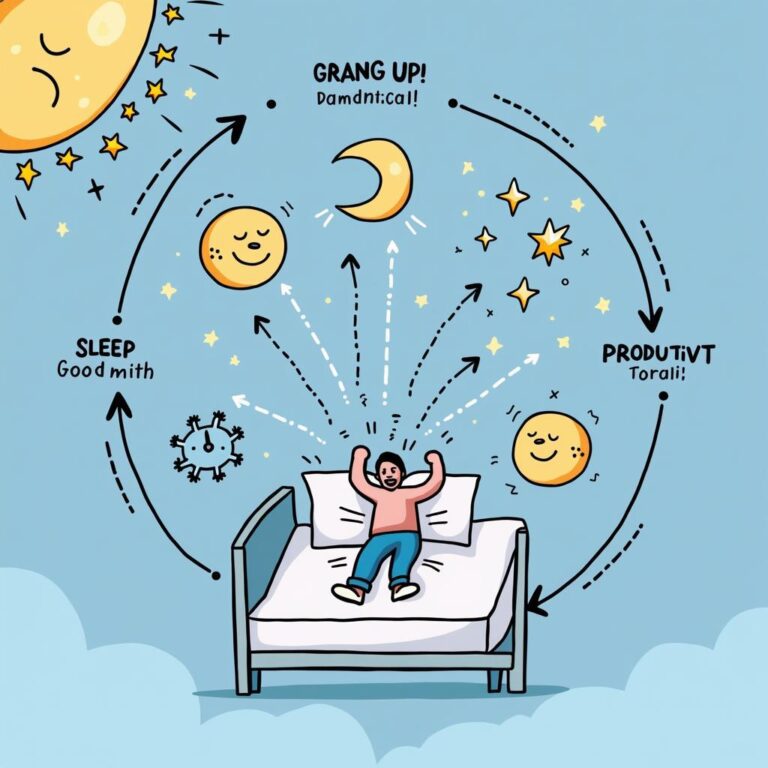Best Time to Wake Up for Optimal Sleep Cycle: A Beginner’s Guide
In today’s fast-paced world, achieving optimal health and well-being is a primary goal for many individuals. Sleep plays an essential role in this equation, significantly impacting our physical and mental health. One of the pivotal components of a good night’s sleep is not just how much sleep you get, but also when you wake up. Understanding the best time to wake up for optimal sleep cycle can help you maximize your rest, enhance your productivity, and improve your overall quality of life. This guide will explore the science behind sleep cycles, the best wake-up times, and practical tips to align your waking hours with your body’s natural rhythms.
Understanding Sleep Cycles
To determine the best time to wake up, it’s crucial to understand sleep cycles. Over the course of a typical night, most people experience multiple sleep cycles, each lasting about 90 minutes. Each cycle consists of various stages of sleep, including:
- Stage 1 (Light Sleep): This is the transition phase when you drift in and out of sleep. It typically lasts for several minutes.
- Stage 2 (Moderate Sleep): In this stage, your heart rate slows, and your body temperature drops. It lasts for about 20 minutes.
- Stage 3 (Deep Sleep): This stage is crucial for physical restoration and recovery. It is more challenging to awaken from this deep sleep.
- REM Sleep (Rapid Eye Movement): Often associated with dreaming, this stage plays a crucial role in memory and mood regulation. REM sleep increases in duration with each cycle.
People generally complete four to six cycles per night. Disruptions during these cycles, especially during deep sleep or REM sleep, can lead to feelings of grogginess and fatigue, regardless of the total sleep duration. Thus, waking up at the right moment can help you avoid this unpleasant state.
What is the Best Time to Wake Up?
The best time to wake up often depends on your unique sleep needs, lifestyle, and commitments. Nonetheless, there are a few general guidelines that can help you find your optimal wake-up time:
1. Calculate Your Sleep Needs
Most adults need between 7 to 9 hours of sleep each night. To find your optimal waking time, first, determine your desired bedtime. If you choose to go to bed at 10 PM, for instance, waking up at either 5 AM or 6:30 AM (to complete 7.5 or 9 hours of sleep) could align with your sleep cycle.
2. Consider the Sleep Cycle
Since sleep cycles last roughly 90 minutes, waking up at the end of a sleep cycle can leave you feeling more refreshed. For example, if you take 7.5 hours of sleep, waking up at either 5 AM or 6:30 AM would enable you to wake up at the end of a cycle (4 or 5 cycles, respectively).
3. Listen to Your Body
Individual preferences and body rhythms vary, so it’s essential to listen to your body’s natural cues. If you consistently feel groggy upon waking at a specific time, it may indicate that you’re waking up in the middle of a sleep cycle. Consider adjusting your bedtime and experimenting with different wake-up times to find what works best for you.
The Impact of Natural Light
Exposure to natural light significantly influences your body’s circadian rhythm, which dictates your sleep-wake cycle. To optimize your wake times:
- Wake Up with the Sun: Aligning your wake-up time with sunrise allows your body to take advantage of natural light, promoting alertness and setting you up for a productive day.
- Limit Blue Light Exposure Before Sleep: Avoid screens at least an hour before bed to help your body wind down naturally.
Tips for Improving Sleep Quality
To achieve the best wake-up experience, it’s essential to prioritize sleep quality. Here are some actionable tips:
1. Establish a Consistent Sleep Schedule
Going to bed and waking up at the same time every day, including weekends, helps regulate your body’s internal clock. Consistency is key to optimizing your sleep cycles.
2. Create a Relaxing Bedtime Routine
Engage in calming activities before bed, such as reading, meditating, or taking a warm bath. This pre-sleep ritual signals to your body that it’s time to wind down.
3. Optimize Your Sleep Environment
Invest in a comfortable mattress and pillows, keep your room dark and cool, and minimize noise to create an ideal sleeping environment.
4. Limit Caffeine and Heavy Meals Before Bed
Avoid caffeine and heavy or spicy foods close to bedtime, as they can disrupt your sleep cycles and lead to difficulties falling asleep.
When Is It Okay to Sleep In?
While establishing a routine is crucial, it’s also essential to listen to your body’s signals. If you’ve had a particularly challenging week or are recovering from illness, allowing yourself to sleep in occasionally can help rejuvenate your body. Additionally, if you find yourself consistently needing to “catch up” on sleep, it may indicate that your current sleep schedule is inadequate.
Conclusion
Finding the best time to wake up for optimal sleep cycle can significantly enhance your overall well-being, productivity, and mood. By understanding the basics of sleep cycles, prioritizing quality sleep, and listening to your body’s natural rhythms, you can optimize your wake-up routine. Remember that individual needs vary, so it’s crucial to adapt these guidelines to fit your lifestyle and preferences. Ultimately, with a bit of experimentation and dedication, you can master the art of waking refreshed and ready for the day ahead.







